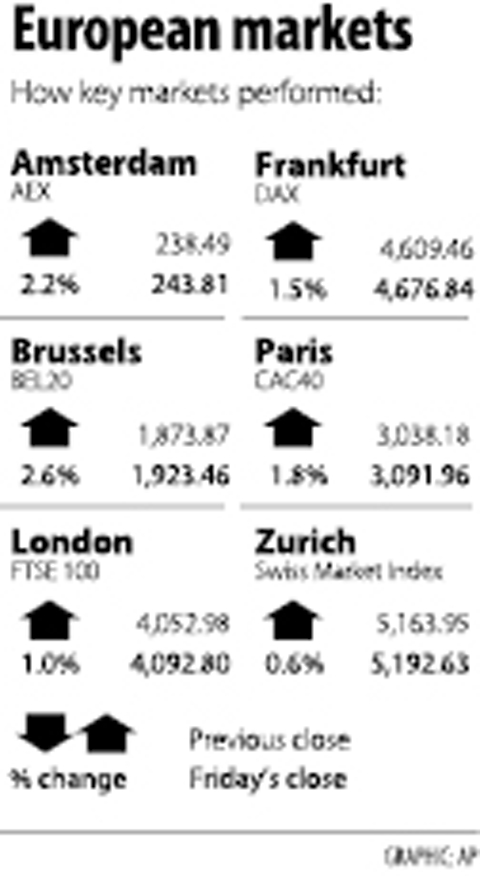European stocks posted the sixth consecutive weekly advance, the longest stretch of gains since January 2006, as speculation grew that the worst of the financial crisis has passed.
The Dow Jones STOXX 600 Index rose 4.7 percent to 196.96, the highest level since Feb. 9. The measure has rebounded 25 percent from a 12-year low on March 9 as lenders signaled they made money at the beginning of this year and the US government unveiled plans to purchase as much as US$1 trillion in toxic assets from financial firms.
“The recent positive earnings from major banks like Goldman Sachs, JPMorgan and Citigroup has improved investor optimism that the worst of the banking crisis may be over,” said Joshua Raymond, a London-based market strategist at City Index. “Investors are now looking toward the banks to restore confidence and the results witnessed thus far have gone some way to doing this.”

The VSTOXX Index, which measures the cost of using options as insurance against declines in the Dow Jones Euro STOXX 50 Index, slid to 36.70 this week, the lowest level since Sept. 25. The index reached a record 87.51 on Oct. 16 following the collapse of Lehman Brothers Holdings Inc.
National benchmark indexes increased in all 18 western European markets. Germany’s DAX climbed 4.1 percent as Deutsche Bank AG rallied, while the UK’s FTSE 100 rose 2.7 percent. France’s CAC 40 added 4 percent.
Financial companies are expected to drive an earnings recovery in the US and Europe. While analysts predict overall profits in the Standard & Poor’s 500 Index will drop 15 percent this year before rebounding 24 percent next year, earnings in the STOXX 600 are estimated to grow 20 percent this year and 15 percent next year, according to Bloomberg data.
UBS added 22 percent, even as Switzerland’s largest bank said it plans to cut another 7,500 jobs amid mounting losses and customer defections. BNP, France’s biggest, climbed 14 percent and Germany’s Deutsche Bank rose 13 percent. A measure of bank shares on the STOXX 600 rallied 10 percent, the best performance among 19 industry groups.

Nvidia Corp yesterday unveiled its new high-speed interconnect technology, NVLink Fusion, with Taiwanese application-specific IC (ASIC) designers Alchip Technologies Ltd (世芯) and MediaTek Inc (聯發科) among the first to adopt the technology to help build semi-custom artificial intelligence (AI) infrastructure for hyperscalers. Nvidia has opened its technology to outside users, as hyperscalers and cloud service providers are building their own cost-effective AI chips, or accelerators, used in AI servers by leveraging ASIC firms’ designing capabilities to reduce their dependence on Nvidia. Previously, NVLink technology was only available for Nvidia’s own AI platform. “NVLink Fusion opens Nvidia’s AI platform and rich ecosystem for

WARNING: From Jan. 1 last year to the end of last month, 89 Taiwanese have gone missing or been detained in China, the MAC said, urging people to carefully consider travel to China Lax enforcement had made virtually moot regulations banning civil servants from making unauthorized visits to China, the Control Yuan said yesterday. Several agencies allowed personnel to travel to China after they submitted explanations for the trip written using artificial intelligence or provided no reason at all, the Control Yuan said in a statement, following an investigation headed by Control Yuan member Lin Wen-cheng (林文程). The probe identified 318 civil servants who traveled to China without permission in the past 10 years, but the true number could be close to 1,000, the Control Yuan said. The public employees investigated were not engaged in national

ALL TOGETHER: Only by including Taiwan can the WHA fully exemplify its commitment to ‘One World for Health,’ the representative offices of eight nations in Taiwan said The representative offices in Taiwan of eight nations yesterday issued a joint statement reiterating their support for Taiwan’s meaningful engagement with the WHO and for Taipei’s participation as an observer at the World Health Assembly (WHA). The joint statement came as Taiwan has not received an invitation to this year’s WHA, which started yesterday and runs until Tuesday next week. This year’s meeting of the decisionmaking body of the WHO in Geneva, Switzerland, would be the ninth consecutive year Taiwan has been excluded. The eight offices, which reaffirmed their support for Taiwan, are the British Office Taipei, the Australian Office Taipei, the

CAUSE AND EFFECT: China’s policies prompted the US to increase its presence in the Indo-Pacific, and Beijing should consider if this outcome is in its best interests, Lai said China has been escalating its military and political pressure on Taiwan for many years, but should reflect on this strategy and think about what is really in its best interest, President William Lai (賴清德) said. Lai made the remark in a YouTube interview with Mindi World News that was broadcast on Saturday, ahead of the first anniversary of his presidential inauguration tomorrow. The US has clearly stated that China is its biggest challenge and threat, with US President Donald Trump and US Secretary of Defense Pete Hegseth repeatedly saying that the US should increase its forces in the Indo-Pacific region